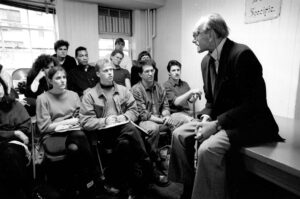

Useful Links
Contact
- The Bridge at Cecil Sharp House
- 2 Regent’s Park Rd, London NW1 7AY
- 020 7424 0860
- admin@thebridge-ttc.org
Social Media


To provide a quick definition of acting you might say it’s the process of playing a character for a stage, screen, or audio production. However there’s much more to it than that and this article will go into detail on two main questions: What is acting? And what is an actor?
The purpose of acting is to bring characters to life and to tell stories. While writers have the job of creating those characters and stories, the actors take them off the page and put them before an audience – whether that audience is in a theatre or on the other side of a television screen. Ultimately acting is an artform designed to evoke emotions in us. We watch acting to be moved, entertained, or educated. There is also a strong sense of escapism as we dive into the illusion of another world that the actors create.
An actor is a performer who inhabits a role of a character for a production and uses acting to communicate with the audience. An actor utilises acting methods and techniques to fully immerse themselves in the role to make their performance more realistic and believable. Actors work under directors who are responsible for overseeing the production and managing all the cast and crew.
An actor’s responsibilities include:
There are several different media in which acting can be performed. Some actors may work exclusively within one medium or a combination. Areas of acting can include:
Theatre
Considered the truest test of acting ability, theatre acting has the added pressures of performing in front of a live audience where, unlike screen acting, there’s no option to just retake or hide behind good editing. Stage actors have to get things right the first time every night. Nerves and stage fright can also be a hindrance for some actors. You also need to ensure that you’re employing effective voice technique. Stage mics can only help you so far. You’ll want to aim to be speaking to the audience members at the very back of the theatre farthest from the stage.
Movies
Film actors or screen actors work on feature length productions which can range from short independent films to large Hollywood blockbusters. Generally film acting has been the most popular form of acting and is what many actors aspire to become successful in. Screen actors will need to be able to work with green screens and special effects.
Television
Acting on television shows can include sitcoms, serial dramas, soap operas. A television actor will often play recurring characters who will appear over multiple episodes or seasons. In recent years streaming services like Netflix or Disney+ have seen their popularity soar and budgets for shows exclusive to these platforms are increasing as well meaning bigger production values and bigger names starring in them.
Voice-over
Voice actors are used to provide audio only for animations, radio plays, and audiobooks. In recent years the video game boom has meant more voice acting work available in that industry. Voice actors have to be able to communicate emotion and characterisation through their voice alone as the audience can’t see their facial expressions or physicality.
Commercial
Actors can play very small roles in advertisements that will play on television or on the internet such as Ads that play at the start of YouTube videos. Bigger companies are able to pay to get bigger acting names selling their products or services. But most adverts feature lesser known actors hoping to get more exposure. Commercial actors often only have a small amount of time to work with and may not have any lines to speak.

Good acting is to be fully immersed in the role and to bring the character to life exactly as they’re supposed to be – to fully inhabit the character you’re playing by speaking their words, performing their actions, thinking their thoughts, and feeling their feelings. The lines an actor is given to learn are what a character would say naturally – assuming the writing is good – but there’s much more to it as most people can read words and directions off a page.
Your character didn’t just spring into life at the start of the scene, they have a whole life and background that you need to own as the actor playing them. There will be elements in their past that affect their behaviour in the present. You’ll need to think about what motivates them and what they want in their life. A key indicator of good characterisation is how they react to stimuli – both external and internal. How do they react to the words and actions of other characters (external). How do they react to sudden feelings of anger or fear (internal). The audience can easily spot when a performance is forced and inorganic. It’s important to be believable when acting and not break the illusion. That way the audience is open to be moved and captivated by the performance.
The performance itself needs to meet certain mechanical criteria such as proper voice projection and enunciation. Proper technique allows us to shape-shift into someone else who may be entirely different to ourselves. Good acting also means being a good partner to your fellow actors. Even if you’ve fully nailed your characterisation you are still a cog within the bigger picture of the scene and production. Sir Ben Kingsley has stated before that he aims to make others in the scene look good – not just look out for himself. You must also be willing to adapt or improvise if necessary while staying in character – for example, if a scene partner misses their cue or fluffs a line.
Acting requires much more than just reciting lines while pretending to be someone else. Most actors need years of training and experience to fully develop their skills and be brought up to speed on everything they need to know about acting. It requires creativity to improvise and offer bold ideas on how to play a character – as well as in-depth analytical skills to master complex scripts including Shakespeare. Natural talent will only get you so far in acting – there is a lot that you’ll need to learn from other people.
There is a certain fearlessness that’s required for acting. Not least to perform in front of others but also to be vulnerable in front of others and with ourselves. It can be a real challenge to let go of your own inhibitions and hang-ups for the sake of a good performance. Also tapping into difficult emotions and subject matter can leave actors in tears after a rehearsal or performance. Building emotional resilience is not an easy task for many people.
Apart from the intense training and emotional vulnerability, there’s the logistical side of acting which is a challenge in itself. Just putting on a theatre show or film shoot is a meticulous web of many skilled professionals working in tandem with each other to a strict schedule with no room for error allowed – and then having to do it again the next day.
Acting is an art form and humans need art in the world as it enhances our society and provides great benefit to people. It’s why societies put actors and musicians on such high pedestals. Most people wouldn’t want to imagine a world without movies, shows, theatre, music, comedy, paintings, or literature. As George Bernard Shaw said: “Without art, the crudeness of reality would make the world unbearable.”
Acting can make us think about morality and how we can better ourselves. It can act as a reflection on our society and act as a time capsule for future generations to view a cultural snapshot of our time and mentalities. It’s why people still watch great films from the golden age of cinema in the first half of the 20th century. The big shows and movies that come out in our lifetime that we know and love will still be watched by people long after we’re gone.
Looking to find out more and to try acting for yourself? The Bridge Theatre Training Company in London provides professional acting courses to help you hone your acting skills and launch your acting career.
